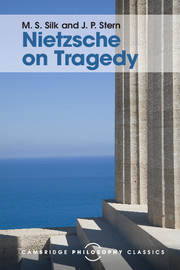Book contents
- Frontmatter
- Dedication
- Epigraph
- Contents
- Preface to this edition
- Preface
- Note
- 1 Germany and Greece
- 2 Biographical background I: Nietzsche and his early interests
- 3 Biographical background II: the genesis of The Birth of Tragedy
- 4 The argument of The Birth of Tragedy
- 5 The aftermath
- 6 Nietzsche's account of Greece
- 7 Mode and originality
- 8 Tragedy, music and aesthetics
- 9 Nietzsche and earlier German theories of tragedy
- 10 Style and philosophy
- Bibliography
- Index
6 - Nietzsche's account of Greece
Published online by Cambridge University Press: 05 August 2016
- Frontmatter
- Dedication
- Epigraph
- Contents
- Preface to this edition
- Preface
- Note
- 1 Germany and Greece
- 2 Biographical background I: Nietzsche and his early interests
- 3 Biographical background II: the genesis of The Birth of Tragedy
- 4 The argument of The Birth of Tragedy
- 5 The aftermath
- 6 Nietzsche's account of Greece
- 7 Mode and originality
- 8 Tragedy, music and aesthetics
- 9 Nietzsche and earlier German theories of tragedy
- 10 Style and philosophy
- Bibliography
- Index
Summary
The Birth of Tragedy and classical scholarship
The Birth of Tragedy is not a work of classical scholarship. It does contain a good deal of incidental material which only a scholar would be likely to know; and it takes a good deal for granted in a way that only a scholar could find natural. It could only have been written by one who, whatever else he was or wanted to be, was a scholar. And if there is any single group of readers that it seems to presuppose, it can only be a select group of sympathetic, or at least open-minded, classical scholars. But the book is still not a work of scholarship. Not only does it denounce from the pulpit, with all the strident vigour at its author's command, the heresy of Socratism, of which all science and scholarship are expressions. It also practises what it preaches by flouting most of the obvious norms of scholarly prose and striving after other, less ‘Socratic’, virtues. And yet it represents a significant contribution to the appreciation of the cultural and spiritual realities of the ancient world. As such, and despite Wilamowitz, it has come to exert a considerable influence on subsequent Greek scholarship. Eduard Fraenkel – one of the foremost scholars of our own century and himself a pupil of Wilamowitz – once suggested that ‘the most powerful factor in the difference of outlook between Wilamowitz and [Fraenkel's] own generation was the influence of Nietzsche’. BT has been the main source of that influence, and it continues to deserve the attention of serious students of antiquity today.
As a comment on Greek culture Nietzsche's book is an extraordinary composite of brilliant insight, expressed with unforgettable force, conventional wisdom, sloppiness, speciousness, distortion and (for lack of a better name) artistic construct. It would have been convenient to use Wilamowitz as an expert adviser to help separate the ingredients of this strange mixture. Unhappily, Wilamowitz, in the violence of his objection to Nietzsche's explicit assault on scholarship and unbalanced by his own personal interest, evaded or denied Nietzsche's insights and misrepresented his procedures. That unspeakable book (Wilamowitz assured the world) was all sloppiness, speciousness, distortion – and furthermore (he added half a century later) its unspeakable author had no scholarly credentials anyway.
- Type
- Chapter
- Information
- Nietzsche on Tragedy , pp. 157 - 225Publisher: Cambridge University PressPrint publication year: 2016

